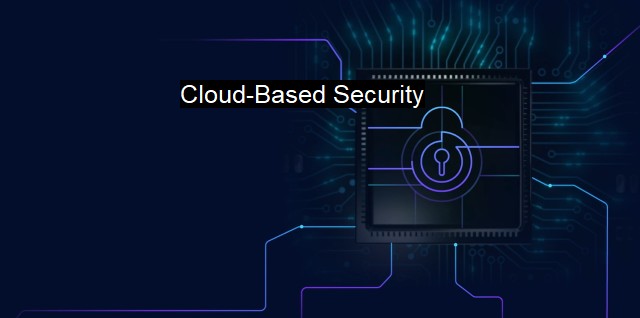What is Cloud-Based Security?
Boosting Cybersecurity with the Power of the Cloud: A Comprehensive Guide to Cloud-Based Security Solutions
Cloud-based security refers to a high-tech method of providing cybersecurity protections at a network level using cloud computing. It is rapidly becoming a preferred security method for businesses and organizations that use cloud systems or networks. A subsection of broader cloud computing services, cloud-based security involves protecting a network, its data, and systems from various cybersecurity threats.Cloud-based security works through the security provider maintaining its services on the cloud. The business that leverages these services receives security benefits via online connectivity. It is like hiring a security guard who, instead of patrolling one building, protects all of the devices that are using the cloud at a given point. In a more technical term, cloud service providers (CSPs) offer IT security as a Service (SECaaS), where CSPs handle threat monitoring and management, filtering out spam, viruses, and malicious activities. Being based on the cloud, these security protocols can work anywhere with an internet connection, managing threats in real time.
In the context of antivirus provisions, cloud-based security eliminates viruses, malware, and other cybersecurity threats before they reach the user’s system. It resides on the internet, scans the traffic coming to each device for discrepancies, and neutralizes potential threats before they arrive at the end-user's system. A conventional antivirus software installed on a specific device only acts as a localized layer of protection. cloud cyber-security creates a protective layer delivering more significant protection over every cloud-connected system.
The advantages of employing cloud-based security are numerous and prominent. Most effectively, it provides real-time defense against potential cyber threats. While earlier, the security systems only came into play after the malicious software had accessed the system, cloud cyber-security can now proactively scan and neutralize potential threats before harming the system. Thus, cloud security always stays ahead of threats, never allowing them to breach the security fortress.
General data security is another area augmented by cloud-based security services. When users store sensitive data in the cloud, robust cloud security implementations ensure encryption, regulate access controls, and handle secure data transmission, preventing potential data leaks, loss, or corruption. cloud security delivers around the clock, providing uninterrupted enterprise-scale security without requiring round-the-clock human IT administration.
Cloud-based security also simplifies security management across multiple domains and allows data non-locality. Thus, businesses can protect multiple devices across various locations, accessing data from any secure device- offering enhanced operational flexibility. In this vein, cloud-based securities are highly scalable according to evolving business needs, where you pay for what you use and can increase your security package as needed.
Continuity is an essential part of cloud-based security- as it automatically updates itself to cope with continually evolving cyber threats. For enterprises, automatic updates mean access to the newest security features without having any impact on the system's performance or the requirement of constant IT supervision.
While discussing the merits, it is crucial to also consider the challenges associated with cloud-based security. The most significant challenges include requiring a continuous internet connection and the potential susceptibility to cyber-attacks aimed at the cloud security system itself. issues related to data governance, cloud service discontinuity, and privacy are relevant concerns to consider.
With evolving technology and increasing reliance on digital infrastructure, cloud-based security offers a revolutionary method for businesses and organizations to protect their vital data and systems against mounting cybersecurity threats.

Cloud-Based Security FAQs
What is cloud-based security?
Cloud-based security refers to the practice of using cloud computing technology to deliver cybersecurity services such as antivirus, network security, and threat intelligence. In this model, security is provided as a service through a third-party provider, who manages the infrastructure, software, and updates.What are the benefits of cloud-based security?
Cloud-based security offers several advantages, such as scalability, flexibility, and cost-effectiveness. It allows organizations to quickly scale up or down their security needs based on their business requirements. It also enables them to leverage the latest technologies and tools without having to invest in hardware and software. Additionally, cloud-based security services usually provide real-time monitoring, proactive threat detection, and automated response capabilities, which improve overall security posture.Is cloud-based security as secure as on-premise security solutions?
Cloud-based security solutions can be just as secure as on-premise options if they are implemented and managed correctly. The primary security concern with cloud-based security is data privacy and integrity, as sensitive information is transmitted and stored outside an organization's control. However, reputable cloud providers follow industry-standard security practices and comply with specific regulations to ensure the safety of their customers' data. Furthermore, cloud-based security solutions often provide more comprehensive security measures, such as multi-factor authentication, intrusion detection and prevention, and data encryption, making them more secure than traditional on-premise solutions.What are some common types of cloud-based security services?
Some common types of cloud-based security services include antivirus software, firewalls, intrusion detection systems, vulnerability scanners, and threat intelligence platforms. Antivirus software protects against malware and viruses, while firewalls and intrusion detection systems secure network perimeters and detect unauthorized access attempts. Vulnerability scanners identify and assess security holes in software and hardware, while threat intelligence platforms provide real-time information on emerging security threats.| | A | | | B | | | C | | | D | | | E | | | F | | | G | | | H | | | I | | | J | | | K | | | L | | | M | |
| | N | | | O | | | P | | | Q | | | R | | | S | | | T | | | U | | | V | | | W | | | X | | | Y | | | Z | |
| | 1 | | | 2 | | | 3 | | | 4 | | | 7 | | | 8 | | |||||||